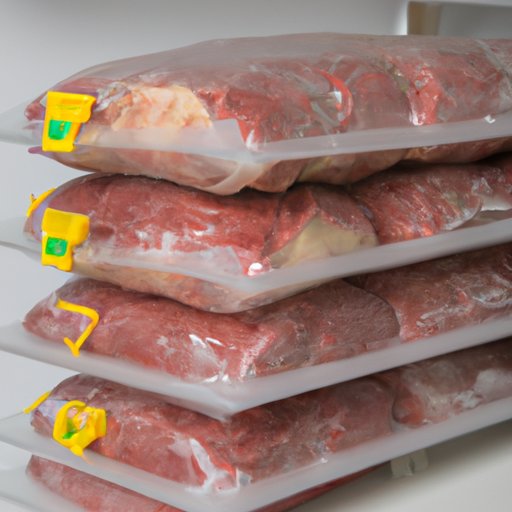Introduction
Freezing meat is a great way to preserve it for future use. But how long can you keep meat in the freezer before it goes bad? Understanding the basics of freezing and storing meat is key to making sure your food stays safe and delicious.
In this article, we’ll explore the best practices for freezing and storing meat, as well as how long different types of meat can last in the freezer. We’ll also cover what to look for when determining if frozen meat has gone bad and how to maximize its shelf life.
How to Store Meat in the Freezer: A Guide to Maximum Shelf Life
When freezing meat, it’s important to package and label it properly. This will help ensure that the meat remains fresh and safe to eat. It’s also important to maintain the correct temperature for frozen meat. To do this, set your freezer to 0°F or below.
You should also take steps to prevent freezer burn. This occurs when air comes into contact with the meat, causing it to dry out and lose flavor. One way to prevent this is by using an appropriate storage container or wrap. Choose one that is airtight and moisture-proof.
The Definitive Guide to Keeping Meat Fresh in the Freezer
Certain types of meat freeze better than others. These include beef, pork, chicken, turkey, and fish. You can also freeze ground meats like beef and turkey, as well as processed meats such as hot dogs and sausage.
To keep your frozen meat as fresh as possible, there are some simple tips to follow. First, make sure the meat is tightly wrapped or sealed in a container. This will help keep out air and prevent freezer burn. Second, place the meat at the back of the freezer, away from the door, where the temperature is most consistent.
It’s also important to avoid overfilling your freezer. Doing so can cause the temperature to fluctuate, which can reduce the shelf life of your frozen meats.
How Long Can You Keep Meat in the Freezer and Still Enjoy it?
The shelf life of frozen meat depends on several factors. These include the type of meat, the way it was packaged, and the temperature of the freezer. In general, most meats can be kept in the freezer for up to six months for optimal quality.
For specific types of meat, here are some recommended storage times:
- Beef: 4-12 months
- Pork: 4-6 months
- Chicken: 9-12 months
- Turkey: 12 months
- Fish: 3-6 months
- Ground meats: 3-4 months
If the meat has been stored for longer than these times, it may not be safe to consume. Look for signs that indicate it’s time to discard the meat. These include discoloration, sliminess, off-odors, and freezer burn.

Understanding the Shelf Life of Frozen Meats
When buying frozen meat, pay close attention to date labels. All packages should have a “sell by” date, which indicates when the product should be sold. There may also be a “use by” date, which indicates the last day the product should be eaten. If the “use by” date has passed, discard the meat.
It’s also important to remember that the “use by” date is not an indication of safety. Even after this date has passed, the meat may still be safe to eat if it has been properly stored and handled. However, if the meat shows any signs of spoilage, discard it immediately.

What You Need to Know About Freezing Meat for Later Use
Sometimes you may need to thaw and refreeze meat. As long as the meat was frozen before the expiration date and has been handled properly, it’s usually safe to refreeze. However, it’s important to follow safe handling guidelines. For example, thawed meat should never be left at room temperature for longer than two hours.
When cooking frozen meat, make sure it’s cooked to an internal temperature of at least 165°F. This will kill any bacteria that may be present. Also, make sure to cook all parts of the meat evenly to avoid undercooking.

How to Maximize the Shelf Life of Your Frozen Meat
The best way to maximize the shelf life of your frozen meat is to keep air out of the packages. This can be done using vacuum sealers, which remove air and create an airtight seal. Vacuum sealing can extend the shelf life of meat by up to five times.
You can also freeze meat in smaller portions. This makes it easier to thaw only the amount of meat you need. It also reduces the risk of freezer burn, since there is less surface area exposed to air.
Best Practices for Freezing and Storing Meat Safely
It’s important to practice good food safety habits when freezing and storing meat. Make sure to keep your freezer clean and free of debris. Also, avoid cross contamination by washing your hands, utensils, and surfaces often.
Finally, always follow the manufacturer’s instructions for storage and handling. This will help ensure that your meat stays safe and delicious.
Conclusion
By following the tips outlined in this article, you can keep your frozen meat safe and tasty for up to six months. Proper packaging and labeling, temperature control, and prevention of freezer burn are all key components of successful meat storage.
With the right strategies, you can enjoy delicious, high-quality meat for weeks or even months. So don’t be afraid to stock up – just be sure to follow the guidelines for safe storage and handling.


